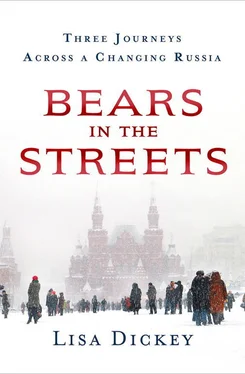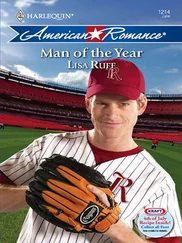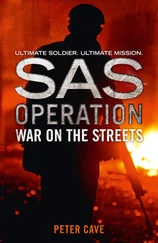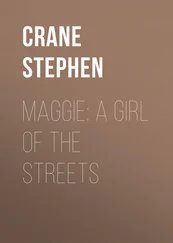Nina was still working as a physician, at the same polyclinic as in 1995. But she told me that life had “gotten worse. I have so much paperwork now, there’s no time to work with the patients. It has become a nightmare.” She’d traveled abroad often over the past ten years, visiting France, Spain, Austria, and India, among other places. But the onetime disenchanted Komsomolka still expressed a firm patriotic preference for Russia. “No place is as beautiful as St. Petersburg,” she told me. “No museum is as beautiful as the Hermitage.”
Boris was working as a psychologist, and in the decade since we’d seen each other, he’d married and gotten divorced. Characteristically, he didn’t want to talk much about himself, but instead turned the conversation to Vanya, who was now 16. When I’d met six-year-old Vanya in 1995, he was entering a special school for intensive English language study. Now in his final year of high school, he could speak English with ease.
I decided to make Vanya the centerpiece of the ten-years-later story. And not just Vanya, but his fellow classmates too—young people who had no memory of Soviet times, who were now the future of Russia. I arranged to meet him at a restaurant near his school and asked him to invite some friends to join us.
Vanya was tall, ruddy-cheeked, athletic, and polite enough to field my multitude of questions. In return, all he wanted was a decent translation of a White Stripes song title: “What does ‘Seven Nation Army’ mean?” he asked me. “I can’t figure it out.” Sadly, I wasn’t sure either, but he graciously agreed to continue with the interview.
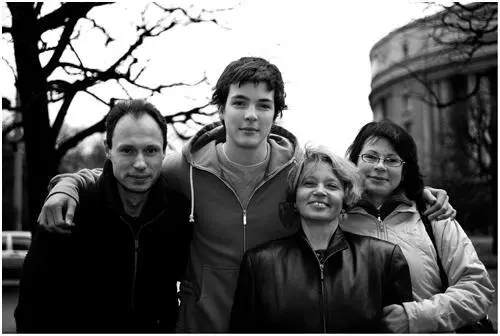
Boris, Vanya, Nina, and Vanya’s mother Zhenya, 2005 (PHOTO BY DAVID HILLEGAS)
He brought three classmates: mop-haired, mustachioed Misha; sober Pasha; and shy, curly-haired Tonya—all 16-year-old students at the Gymnasium for Global Education No. 631. We met for lunch at a Chinese restaurant, which seemed an appropriately global choice, and for the next hour we talked—in English—about their hopes, dreams, and fears.
I came into the interview with certain expectations. Having just completed my 2005 trip across Russia, and having seen how much better people’s lives and economic situations were, I expected Vanya and his friends to be optimistic about the future. But from the start, their responses surprised me.
When I asked how Russia had changed over the last ten years, Tonya spoke first. “The first thing that’s changed is the mind of the people,” she said. “Now they don’t live for the country; they live for themselves. There’s no united country, like there was in Soviet times.”
“There’s a difference between the relations of people and the government in Russia,” Pasha added. “In the USSR, the government was very attentive to people, to their interests. Practically 99 percent of people had higher education. [1] In 1989, near the end of the Soviet era, the census showed that 64 percent of Soviets had completed secondary education, while 23 percent had completed higher education.
Education in the USSR was free to all: if you passed exams, you could go to any university you liked. But nowadays it’s difficult to enter, because the universities don’t have good support from the government.”
He went on. “The second thing is, in Russia today, of course we have more freedom. In the USSR, there were a lot of rules people had to follow, but now the rules are minimized. I think that’s good.” But he did bemoan one development: “There was no such thing as poverty then, but nowadays a lot of people are below the poverty line. It is a problem.”
“In our lives now, maybe we have more freedom,” Misha chimed in. “But I think we don’t need this freedom, because we don’t know what to do after university. In the Soviet Union, if you wanted to choose a career, you went to the university and then to work. Nowadays, you can go anywhere—but you don’t know what to do. Making a choice is difficult.”
Vanya added, “In the Soviet Union, we were like one big society that just tried to solve our own problems with the help of our neighbors. We have democracy now, but it hasn’t been developed in the right way.”
What did they think the future held? Would the situation in Russia get better, or worse?
“Worse,” Misha said, without hesitation. “Practically all the economics in our country is influenced by the course of oil prices. And now we’re exporting to practically every country. So, when fuel oil in our country is finished, it will be a very big problem. I think the problems will start in six years, and then in sixty years, we’ll have no more oil left.”
Misha’s pessimism about Russia’s one-note economy would prove prescient ten years later—though not because oil was running out, but because a global glut would drive down prices. I expressed surprise that the students were so concerned about oil running out, as I wasn’t aware this was a serious concern during our lifetimes. All the students believed it would, however, and Pasha added that he’d read all about it on the Internet.
“Are you all really as pessimistic as you sound?” I asked.
“Not pessimistic,” Misha replied. “Just realistic.”
Pasha did venture that Russia would become the leader of the world in information technology (IT), which he called “the future of society.” “The Russian government has taken steps to achieve this,” he told me. “In St. Petersburg, we’re building a center of information technology. We’ll have the best programmers and specialists. Science is the future of the Russian federation.”
“There will be pluses and minuses in the future,” Vanya concluded. “Perhaps more pluses. And while people are pessimistic, or realistic, I think they will still try their best to keep Russia strong.”
So, where did they think they’d all be in ten years? All four students said they hoped to be living and working in Russia. “I like my country very much,” Pasha said, “and I will stay and work only here. Because I want my country to be the best country.”
Vanya was more circumspect. “It’s a difficult question for me. If I become an engineer, which I hope, I think there’s a 90 percent chance I’ll be here. I think that Russia is developing not only its high-tech industry, but construction too, so I hope I’ll be able to find a good job here.”
Ten years later, it was time to find out if Vanya’s hope had come true.
* * *
The night I arrived in St. Petersburg, I checked my iPhone’s weather app to find that the only sunny afternoon in the entire coming week would be the following day. St. Petersburg is notorious for its wildly changing weather, but the row of uninterrupted raincloud icons convinced me that before I sought out Boris, Nina, and Vanya, I should take that one precious sunny day to explore.
I took the metro to bustling Nevsky Prospekt, the city’s main thoroughfare, and happily began strolling. St. Petersburg had been spruced up since I lived here in the mid-nineties, but unlike Moscow, it didn’t feel radically changed. I walked past the Griboyedov Canal, with its onion-domed Church on Spilled Blood (named after the spot upon which Tsar Alexander II was killed by an assassin’s bomb), then past Dom Knigi, with its rows of books displayed in the windows. Across the street, the Kazan Cathedral gleamed in the sun, and a few blocks later, I passed by the Moika Canal and the Literaturnoye Café, where Alexander Pushkin was said to have had his last meal before being shot to death in a duel. The café had been there forever, but it did have one new element: a mannequin wearing eighteenth-century garb and a curly Pushkin wig had been propped at a window table.
Читать дальше
